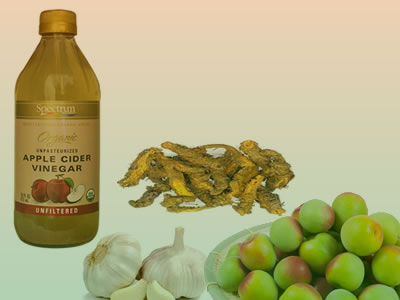Garlic, vinegar, ume and coptis can be used as remedies to help prevent and treat E. coli.
E. Coli (Escherichia coli) are bacteria that are commonly found in the lower intestines of humans and animals. Most E. coli strains do not cause illness in humans, but some strains of E. coli can cause serious illness. E. coli infections can occur throughout the year, but are more common in the summer. E. coli O157:H7 is one of the most common types of the infections.
How to reduce the risk of E. coli infections
The most common cause of E. coli O157:H7 infection is undercooked contaminated foods, such as ground beef, sprouts, lettuce, spinach, etc. To reduce the risk of the infections, you should:
1. Always wash hands after using toilet, and before preparing or eating food.
2. Always wash foods before cooking or eating.
3. Eat boiled vegetables instead of raw salads. Boiling water can kill E. coli.
4. If you still want to eat raw salad, add garlic to it. Garlic can kill E. coli.
5. Cook beef, pork, chicken and other meats thoroughly. Make sure the internal temperature of the meat is at least 160°F.
6. If you still want to eat raw, uncooked or not “well-done” cooked fish, oysters, beef or other meats, add garlic, vinegar or ginger to it.
Garlic, vinegar, ume and coptis help prevent and treat E. coli
Garlic has antimicrobial effects. Adding garlic to a food, can reduce the risk of E. coli infection. According to a study published in 2005, researchers compared the antimicrobial activity of garlic, ginger, carrot, and turmeric pastes against Escherichia coli O157:H7 in laboratory buffer and ground beef. The results shown that, Commercial ginger paste and fresh garlic paste showed the strongest antimicrobial activity with complete inactivation of E. coli O157:H7 in the paste at 3 days at 4 degrees C and 8 degrees C.
Vinegar also has antimicrobial effects. Traditional Japanese Sushi is made from rice with Vinegar. Adding vinegar to the rice, is not only for the taste, but also for antimicrobial purpose – to keep the food longer in room temperature. Sour pickling liquid and sour pickled vegetables have the similar effects as vinegar. It is a folk remedy in China, drinking a cup of sour pickling liquid might help treat summer dysentery or diarrhea. Recent studies have confirmed the antimicrobial effects of vinegar, especially in reducing E. coli O157:H7. Scientists recommend to soak vegetables in vinegar for 3-5 minutes to kill the E. coli.
Ume (Prunus mume, Wu Mei) is an Asian species of the genus Prunus. Ume has long been used in East Asia (China, Japan and Korea) as a traditional medicine to treat dysentery and diarrhea. According to a study in South Korea in 2007, both fresh Prunus mume and Prunus mume liqueur byproduct showed strong antibacterial effects against tested pathogenic bacteria, including Escherichia coli O157:H7.
Coptis is a very bitter herb. It has strong antimicrobial effects. Coptis (Huang Lian) has been used for centuries in traditional Chinese medicine. Coptis can be used alone or combined with other herbs. A classic formula named Xiang lian Wan contains Coptis. It is an effective medicine for treating dysentery and diarrhea, including the problem caused by E. coli.
Please note, the remedies may help prevent E. coli infection, or help treat minor infection, but if you suffer from a serious E. coli infection, you should seek medical care immediately.
References
- Escherichia coli O157:H7 outbreak associated with consumption of ground beef, June–July 2002, Vogt RL, Dippold L, 2005, Public Health Rep 120 (2): 174–8.
- A comparison of the antimicrobial activity of garlic, ginger, carrot, and turmeric pastes against Escherichia coli O157:H7 in laboratory buffer and ground beef,
Gupta S, Ravishankar S. Foodborne Pathog Dis. 2005 Winter;2(4):330-40. - Preliminary study: vinegar washing reduces risk of E. coli O157:H7 in lettuce, Institute of Agriculture and Natural Resources, University of Nebraska-Lincoln. 1999.
- Antibacterial Activity of Fresh Prunus mume and Prunus mume Liqueur Byproduct, Park, L.Y. Chae, M.H. Lee, S.H. Journal of Food Hygiene and Safety (Jun 2007), Vol. No. v. 22(2) p. 77-81.



